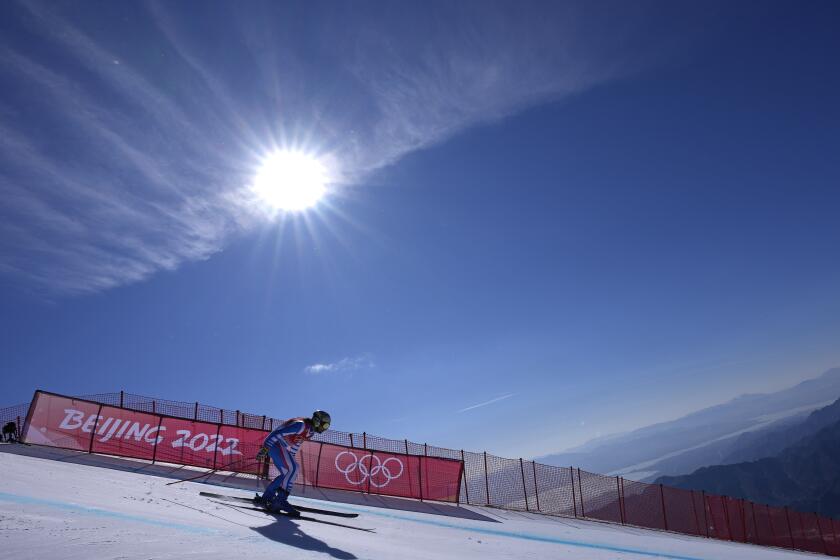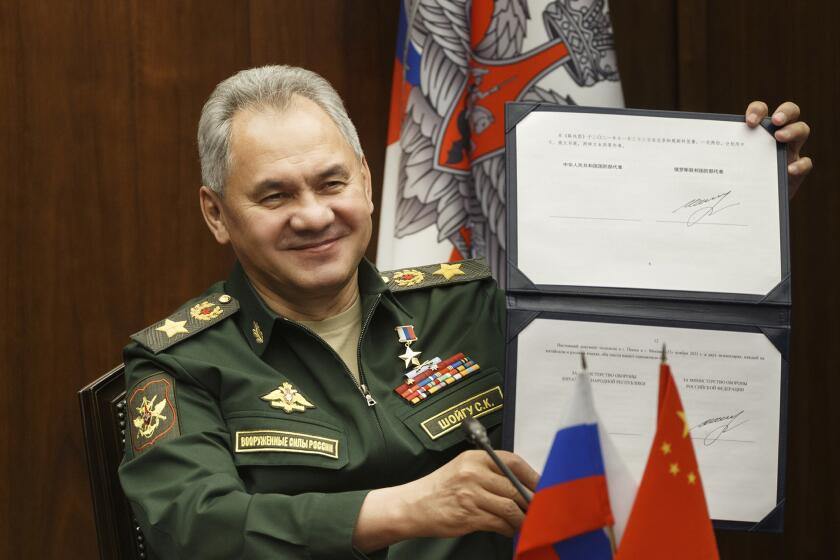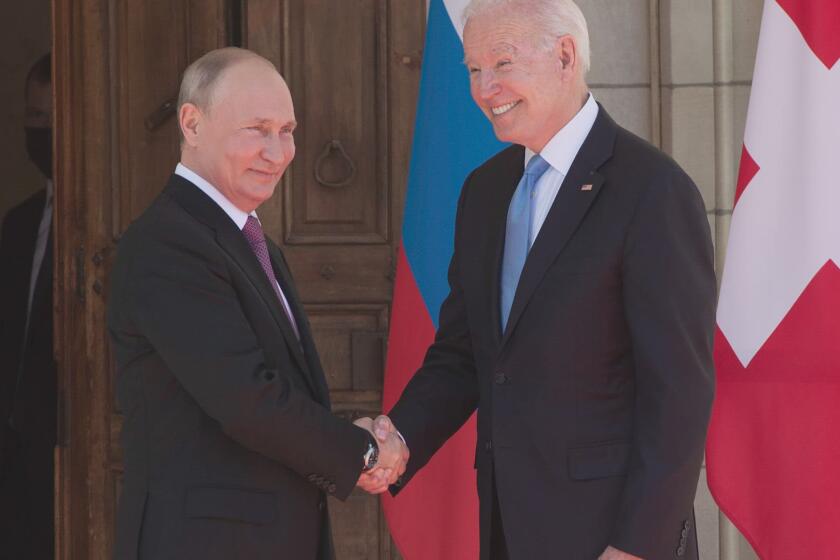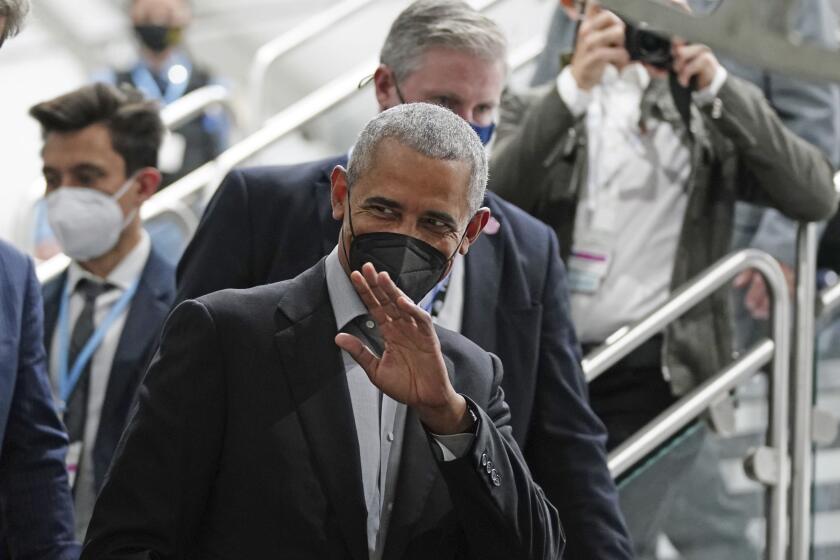Putin and Xi push back against the U.S. at their pre-Olympics summit
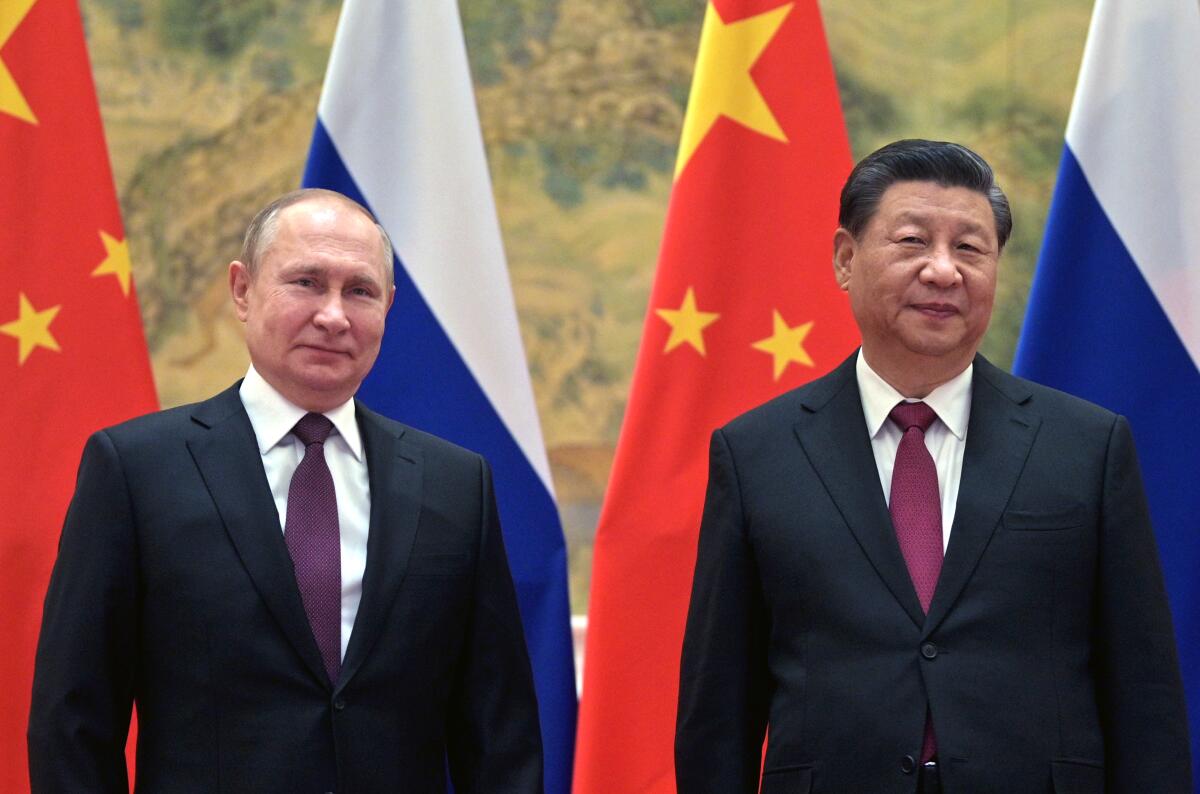
- Share via
BEIJING — The leaders of Russia and China pushed back against U.S. pressure Friday, declaring their opposition to any expansion of NATO and affirming that Taiwan is a part of China in a summit hours before the opening of the Winter Olympics.
Russian President Vladimir Putin and Chinese President Xi Jinping issued a joint statement decrying what they called “interference in the internal affairs” of other states, even as Russia builds up troops on its border with Ukraine and China hosts the Winter Games.
“Some forces representing a minority on the world stage continue to advocate unilateral approaches to resolving international problems and resort to military policy,” it read, in a thinly veiled reference to the U.S. and its allies.
The two leaders are looking to project themselves and their countries as a counterweight to the U.S. and its allies, as China shows increasing support for Moscow in its dispute with Ukraine, which the West warns could result in a Russian invasion.
China and Russia are committed to “deepening back-to-back strategic cooperation,” Xi was quoted as telling Putin.
“This is a strategic decision that has far-reaching influence on China, Russia and the world,” Xi said, according to the official Xinhua News Agency.
For China’s leader, a successful Winter Games means international validation. It proves that he has strengthened China and the world must play along.
Faced with a “complex and evolving international situation,” the two sides “strongly support each other” in confronting what Xi called “regional security threats” and “international strategic stability,” without directly naming the U.S.
Putin is the highest-profile guest at the Beijing Winter Olympics following the decision by the U.S., Britain and others not to send officials in protest of China’s human rights abuses and its treatment of Uyghurs and other Muslim minorities.
Meeting with Xi, Putin praised “unprecedented” close relations with China, in opening remarks carried by Russian television.
Relations “are developing in a progressive way with a spirit of friendship and strategic partnership,” Putin said. “They have indeed become unprecedented. It’s an example of dignified relations that support mutual development.”
Russia and China, in committing to closer military ties, point to increasingly frequent U.S. strategic bomber flights near both countries’ borders.
Putin highlighted close economic ties, including a new contract to supply China with 10 billion cubic meters of gas per year from eastern Russia.
“For our meeting today, our oilmen have prepared very good new solutions for the supply of hydrocarbons to the People’s Republic of China, and another step forward has been taken in the gas industry,” Putin said.
Russia has long been a key supplier of oil, gas and coal for China’s massive economy, now the world’s second-largest, along with foodstuffs and other raw materials.
Xinhua reported that the two leaders met at the Diaoyutai State Guesthouse in central Beijing on Friday afternoon, but gave no details. They did not appear to shake hands when greeting each other because of COVID-19 precautions.
The biggest foreign policy challenge for President Biden is coming not from Asia, but from a more traditional nemesis, Russia’s Vladimir Putin.
Putin also recalled his presence in Beijing for the 2008 Summer Olympics and the Chinese delegation’s attendance at the 2014 Winter Games in Sochi, Russia, calling such exchanges “to a certain extent a tradition.”
The discussions mark the two leaders’ first in-person meeting since 2019 and come as China and Russia increasingly align their foreign policies and in world bodies such as the United Nations in opposition to the U.S.-led bloc.
Leaders of the five ex-Soviet Central Asian nations, which have close ties with both Russia and China, all followed Putin’s lead and are attending, along with other states that have political and economic interests with Beijing.
U.N. Secretary-General Antonio Guterres and World Health Organization Director Tedros Adhanom Ghebreyesus were among other dignitaries who arrived Thursday.
Start your day right
Sign up for Essential California for the L.A. Times biggest news, features and recommendations in your inbox six days a week.
You may occasionally receive promotional content from the Los Angeles Times.
A buildup of more than 100,000 Russian troops near Ukraine has fueled Western fears that Moscow is poised to invade its neighbor. Russia has denied planning an offensive but urged the U.S. and its allies to provide a binding pledge that NATO won’t expand to Ukraine and other ex-Soviet nations or deploy weapons there, and to roll back the alliance’s forces from Eastern Europe — demands firmly rejected by the West.
Putin and Xi accused other countries and alliances of trying to acquire a military advantage that worsens the security of others, citing both NATO and America’s Indo-Pacific strategy of building closer ties with other countries in Asia.
“The parties oppose the further expansion of NATO [and] call on the North Atlantic alliance to abandon the ideological approaches of the Cold War,” the joint statement said.
Chinese Foreign Minister Wang Yi told Secretary of State Antony J. Blinken in a call last week that Moscow’s security concerns needed to be taken seriously and addressed, a statement that marked a notable policy shift for Beijing.
Former President Obama is expressing confidence that the Biden administration will ultimately get its $555-billion climate package through Congress.
Some observers suggested that Beijing is closely watching how the U.S. and its allies act in the standoff over Ukraine as it ponders its strategy on Taiwan, arguing that indecision by Washington could encourage China to grow more assertive toward the self-governing island.
The joint statement said Russia reaffirmed that Taiwan is an integral part of China and opposed Taiwan independence in any form.
Russia and China have held a series of joint war games, including naval drills and patrols by long-range bombers over the Sea of Japan and the East China Sea. In August, Russian troops for the first time deployed to Chinese territory for joint maneuvers.
Putin has also noted that Russia has been sharing highly sensitive military technologies with China that helped significantly bolster its defense capability.
More to Read
Sign up for Essential California
The most important California stories and recommendations in your inbox every morning.
You may occasionally receive promotional content from the Los Angeles Times.
